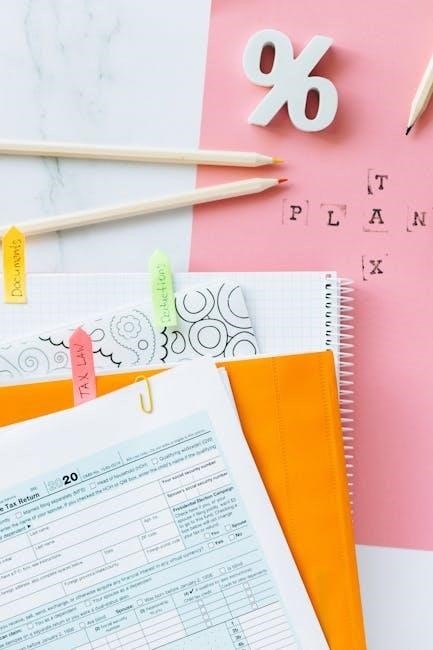
year 4 comprehension worksheets pdf
Year 4 comprehension worksheets are designed to improve reading skills through engaging passages and questions, available in PDF format for easy access and practice․
Overview of Comprehension Skills for Year 4 Students
Year 4 students develop essential reading comprehension skills through structured worksheets․ These resources focus on understanding fiction, non-fiction, and poetry, enhancing abilities to retrieve information, infer meaning, and identify main ideas․ Students learn to differentiate between facts and opinions, recognize cause-and-effect relationships, and comprehend themes․ Worksheets often include questions that test narrative point of view, multiple-meaning words, and summarization․ Engaging stories and varying topics, such as science, history, and everyday experiences, cater to diverse interests․ These exercises improve critical thinking and vocabulary, preparing students for standardized tests and fostering a deeper connection with texts․ Regular practice with these materials helps Year 4 learners build confidence and fluency in their reading abilities, laying a strong foundation for future academic success․

Types of Reading Passages
Year 4 comprehension worksheets feature fiction stories, non-fiction texts, poetry, and themed passages, providing diverse reading experiences to cater to varied learning needs and interests․
Fiction Stories
Fiction stories in Year 4 comprehension worksheets are engaging and relatable, designed to captivate young readers․ These narratives often feature adventures, mysteries, and humorous tales that resonate with children’s experiences․ Each story is followed by questions that test understanding of themes, characters, and plot developments․ For example, stories about magical adventures or everyday challenges encourage students to think critically about the narrative and its meaning․ The inclusion of fiction helps students develop their ability to identify main ideas, predict outcomes, and understand character motivations․ These exercises also enhance vocabulary and imagination, making learning enjoyable․ Many worksheets incorporate illustrations or themes that align with classroom topics, ensuring relevance and engagement․ By focusing on fiction, these resources provide a creative way to build essential reading and comprehension skills for Year 4 students․
Non-Fiction Texts
Non-fiction texts in Year 4 comprehension worksheets expose students to factual information, helping them connect with real-world knowledge․ These passages cover a variety of topics, such as science, history, and biographies, designed to spark curiosity and learning․ Questions accompanying these texts often ask students to identify main ideas, distinguish facts from opinions, and summarize key details․ For instance, passages about animals, historical events, or environmental topics encourage students to think critically about the information presented․ Non-fiction texts also help students develop skills in understanding complex vocabulary and structured writing․ By incorporating real-life scenarios, these worksheets prepare students for academic reading and research․ The inclusion of non-fiction ensures a well-rounded approach to comprehension, complementing the creative elements of fiction and poetry․ This balance helps Year 4 students build a strong foundation in reading and critical thinking․
Poetry and Rhymes
Poetry and rhymes in Year 4 comprehension worksheets introduce students to the rhythmic and creative aspects of language․ These passages often feature engaging verses that explore themes like nature, emotions, and everyday experiences․ Rhyming texts help develop phonological awareness and language skills, while poetry encourages students to interpret imagery and figurative language․ Comprehension questions might ask students to identify rhyme schemes, explain metaphors, or describe the mood of a poem․ Activities also include identifying repeated patterns and understanding the structure of verses․ Poetry and rhymes make learning fun and interactive, fostering a deeper connection to language and creativity․ These exercises are particularly effective for developing critical thinking and appreciation for literary devices․ By incorporating poetry, Year 4 worksheets provide a balanced approach to reading comprehension, blending fun with learning․

Comprehension Strategies
Comprehension strategies include retrieving information, inferring meaning, and summarizing; These skills help students understand texts deeply, identify main ideas, and make logical conclusions, essential for strong reading abilities․

Retrieving Information
Retrieving information is a fundamental skill in Year 4 comprehension worksheets, where students extract specific details from a text․ This involves identifying and recalling facts, such as names, dates, and events, directly stated by the author․ Worksheets often include questions that guide pupils to locate and highlight key information within passages․ For example, a story about a character’s adventure might ask, “What did the main character find in the forest?” or “How did the setting change?” These exercises help students develop accuracy and speed in finding relevant details, which is crucial for building a strong foundation in reading comprehension․ Regular practice with these tasks enhances their ability to process and retain information effectively․
Inferring Meaning
Inferring meaning is a critical comprehension skill that Year 4 worksheets emphasize, encouraging students to go beyond the text and interpret underlying messages․ This involves using context clues, prior knowledge, and logical reasoning to deduce information not explicitly stated․ For instance, worksheets might ask students to infer a character’s feelings based on their actions or dialogue․ Such exercises help pupils develop analytical thinking and deepen their understanding of narratives and non-fiction texts․ By practicing inference, students improve their ability to engage with complex ideas and prepare for higher-level reading challenges․ These activities are often paired with open-ended questions, allowing learners to express their interpretations creatively and confidently․

Benefits of Using Worksheets
Year 4 comprehension worksheets offer numerous benefits for students, enhancing their reading and critical thinking skills․ These structured resources provide focused practice, ensuring learners grasp key concepts effectively․ Worksheets are designed to cater to diverse learning styles, with engaging stories, poems, and non-fiction texts that capture interest․ Their portability and accessibility in PDF format make them ideal for classroom use, homework, or independent study․ By completing these exercises, students improve their ability to retrieve information, infer meaning, and analyze texts․ Worksheets also help teachers identify learning gaps and track progress over time․ With clear instructions and varied tasks, they foster a deeper understanding of literature and prepare students for more complex reading challenges in higher grades․ Regular practice with these resources builds confidence and fluency, laying a strong foundation for future academic success․
Interactive Activities
Year 4 comprehension worksheets incorporate interactive activities to make learning engaging and enjoyable․ These activities include sorting tasks, matching games, and identifying narrative points of view, which cater to diverse learning styles․ For instance, students can sort words into categories like “sight” or “sound” after reading a passage, fostering critical thinking․ Matching games help reinforce vocabulary and comprehension skills, while identifying the narrator’s perspective enhances understanding of storytelling techniques․ Multimedia elements, such as videos or images, are often integrated to provide a dynamic learning experience․ These activities not only make practice more fun but also encourage active participation, ensuring students stay motivated and invested in their learning journey․ By combining traditional reading exercises with interactive elements, these worksheets create a well-rounded approach to improving comprehension skills in Year 4 students․

Role of Teachers
Teachers play a vital role in implementing Year 4 comprehension worksheets effectively․ They design engaging lessons, provide feedback, and guide students through complex texts․ By using these worksheets, teachers can identify learning gaps and tailor instruction to individual needs․ They encourage active participation, fostering a love for reading and critical thinking․ Teachers also use these resources to prepare students for standardized tests and thematic studies․ Their support helps learners build confidence and fluency, ensuring they grasp key comprehension strategies like summarizing and inferring․ Additionally, teachers integrate multimedia elements to enrich lessons, making learning dynamic and relevant․ Their expertise ensures these worksheets are used to their full potential, helping students achieve academic success and a deeper understanding of texts․

Incorporating Multimedia
Incorporating multimedia into Year 4 comprehension worksheets enhances learning by engaging students with interactive elements․ Digital versions of worksheets, available as PDFs, can be easily viewed on electronic devices, making them accessible for both online and offline use․ Multimedia elements such as videos, audio clips, and images can be integrated to supplement reading passages, providing visual and auditory support for better understanding․ This approach caters to different learning styles, especially benefiting visual and auditory learners․ Multimedia also makes lessons more dynamic and relevant, capturing students’ attention and fostering deeper engagement․ By combining text with multimedia, teachers can create a more immersive learning experience, helping students connect with the material on multiple levels․ This integration not only enhances comprehension but also prepares students for a technology-driven world, making learning fun and effective․

Assessment and Progress
Year 4 comprehension worksheets PDFs provide an effective way to assess and track students’ progress in reading skills․ These worksheets include a variety of passages and questions designed to evaluate understanding, allowing teachers to identify strengths and areas needing improvement․ Many resources feature scaled scores and progress tracking, enabling educators to monitor growth over time․ Regular use of these worksheets helps students build confidence and fluency, while also preparing them for standardized tests․ Parents and teachers can use the results to tailor instruction, ensuring targeted support for individual learners․ The inclusion of answers or answer keys in many worksheets simplifies grading and provides immediate feedback․ This structured approach ensures consistent assessment and fosters a clear understanding of students’ developmental milestones in comprehension․
Year 4 comprehension worksheets in PDF format are a valuable resource for developing reading and understanding skills in students․ These worksheets offer a wide range of engaging passages and questions tailored to improve comprehension abilities․ They are designed to be accessible, with many available for free and suitable for classroom use, homework, or additional practice․ By incorporating fiction, non-fiction, and poetry, these resources cater to diverse learning needs․ Teachers and parents can rely on these worksheets to help students build confidence and fluency in reading․ Regular use of these materials prepares students for standardized tests and future academic challenges․ With clear instructions and varied tasks, Year 4 comprehension worksheets provide a structured and enjoyable way to enhance literacy skills․